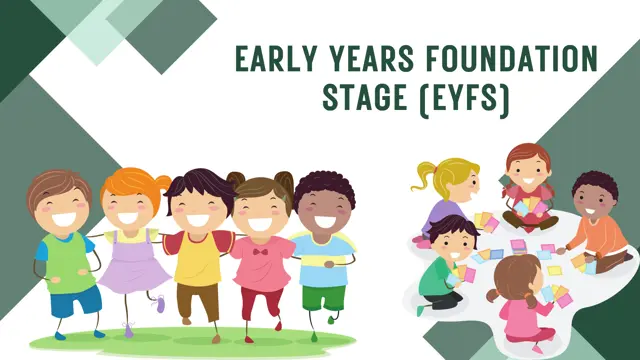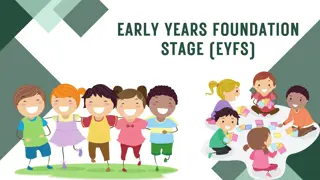
Early Years Foundation Stage (Phonics in Early Years Settings & Child Playwork)
CPD Certified| Free PDF Certificate | Lifetime Access | Learner Support | No Hidden Fees | 100% Success Rate
EDURISE
Summary
- Reed Courses Certificate of Completion - Free
- Tutor is available to students
Add to basket or enquire
Overview
The Early Years Foundation Stage (EYFS) course is your gateway to a rewarding career in early childhood education—a field that's in high demand and shows no signs of slowing down. Let's explore the compelling data that underscores the remarkable demand for professionals trained in EYFS.
The Booming Demand for EYFS Professionals
- Rising Preschool Enrollment: With more parent benefits of early education, preschool enrollment has been on the rise, driving a need for qualified EYFS educators.
- Government Investment: Governments across the globe are increasing investment in early childhood education, creating numerous job opportunities for EYFS professionals.
- Parental Workforce: As more parents enter the workforce, the demand for quality childcare and early education services has grown exponentially.
- Research-Based Approach: There's a growing emphasis on research-based teaching methods in early childhood education, driving demand for EYFS specialists who can implement these strategies effectively.
The Business Advantage of EYFS Training
- Quality Childcare Centers: For businesses operating childcare centers, having trained EYFS professionals on staff ensures the delivery of high-quality early education, attracting more parents and enhancing the center's reputation.
- Regulatory Compliance: EYFS-trained staff ensures that childcare facilities meet government regulations and standards, avoiding penalties and reputational damage.
- Parent Satisfaction: Satisfied parents are more likely to choose childcare centers with certified EYFS educators, resulting in higher enrollment and increased revenue.
Unlock a Fulfilling Career
- Early Childhood Educator: Begin your career as an early childhood educator, nurturing the minds of young children and preparing them for a lifetime of learning.
- EYFS Coordinator: With experience, you can advance to the role of EYFS coordinator, overseeing curriculum development and ensuring that EYFS principles are integrated effectively.
- Educational Consultant: Become an educational consultant, offering your expertise to schools and childcare centers, and helping them implement best practices in EYFS.
Embark on a Journey of Impact
If you're passionate about shaping the future and believe in the power of early education, our comprehensive Early Years Foundation Stage (EYFS) course is the first step towards making a meaningful impact on young minds. Don't miss the opportunity to embark on a career that's not only in demand but also incredibly rewarding. Enroll today and nurture the next generation of leaders and learners.
Curriculum
Course media
Description
Learning Outcomes:
Foundational Knowledge of EYFS Principles: Graduates will gain a comprehensive understanding of the Early Years Foundation Stage (EYFS) framework, its significance, and the principles that guide early childhood education.
Expertise in Child Development: Students will be well-versed in child development during the early years, enabling them to tailor educational experiences to individual needs and milestones.
Effective Curriculum Planning: Graduates will acquire the skills to plan and implement engaging and developmentally appropriate early years curriculum, fostering holistic growth.
Observation and Assessment Skills: Students will develop the ability to observe and assess children's progress accurately, using data to inform teaching practices and support individualized learning.
Supporting Holistic Development: Graduates will learn strategies to support language, communication, physical, cognitive, and mathematical development, creating a well-rounded and inclusive early years environment.
Module Descriptions:
Module 1: Introduction to the Early Years Foundation Stage (EYFS)
- This module provides an overview of the EYFS framework, its historical context, and its role in shaping early childhood education.
Module 2: The Importance of Early Childhood Education
- Here, students explore the significance of early childhood education, its impact on lifelong learning, and the social and cognitive benefits for young children.
Module 3: Key Principles and Aims of the EYFS
- This module delves into the core principles and aims of the EYFS, including the importance of play, individualized learning, and partnerships with parents and caregivers.
Module 4: Understanding Child Development in the Early Years
- Students gain insights into child development theories and milestones, helping them tailor teaching practices to the evolving needs of young children.
Module 5: Creating a Nurturing and Inclusive Early Years Environment
- This module focuses on creating an inclusive and nurturing early years environment that supports diverse learners and promotes well-being.
Module 6: Observing and Assessing Children's Progress
- Students learn effective observation and assessment techniques to track children's progress and plan personalized learning experiences.
Module 7: Planning and Implementing Effective Early Years Curriculum
- This module equips students with the skills to plan and implement engaging and developmentally appropriate early years curriculum that aligns with EYFS principles.
Module 8: Supporting Language and Communication Development in the EYFS
- Here, students explore strategies to promote language and communication development, fostering effective communication skills in young learners.
Module 9: Promoting Physical Development and Well-being in Early Childhood
- This module addresses physical development and well-being in early childhood, emphasizing health, safety, and physical skill development.
Module 10: Encouraging Cognitive and Mathematical Development in the EYFS
- Students delve into strategies for promoting cognitive and mathematical development, fostering problem-solving skills and mathematical literacy in young children.
Who is this course for?
Ideal Audience for the Early Years Foundation Stage (EYFS) Course:
Early Childhood Educators: This course is perfect for educators working in preschools, nurseries, and early childhood centers, providing them with the knowledge and skills needed to excel in their roles.
Childcare Providers: Individuals managing childcare facilities, including home-based and center-based providers, can benefit from this course to enhance the quality of care and education they offer.
Aspiring Early Childhood Educators: Those looking to enter the field of early childhood education will gain a strong foundation in EYFS principles and practices.
Parents and Caregivers: Parents and caregivers interested in understanding early childhood development and how to support their child's growth and learning.
Teacher Assistants: Teacher assistants and aides working in early years settings can enhance their effectiveness by learning EYFS concepts and strategies.
Educational Consultants: Educational consultants and specialists seeking expertise in early childhood education can add this course to their skill set.
Child Development Professionals: Individuals involved in child development research, counseling, and support services can gain valuable insights into early childhood education.
Education Administrators: Administrators and directors of early childhood education programs can use this course to inform curriculum development and program improvement.
Individuals Planning to Open Childcare Centers: Entrepreneurs and individuals planning to open their own childcare centers can prepare themselves with the knowledge needed to meet EYFS requirements.
Professionals in Related Fields: Professionals in psychology, social work, and healthcare who work with young children and families can gain a deeper understanding of early childhood education principles.
Teachers and Educators Transitioning to Early Childhood Education: Educators transitioning from other educational levels to early childhood education can use this course to adapt their teaching practices effectively.
The comprehensive curriculum of this course is designed to cater to a wide range of individuals interested in early childhood education, from educators and childcare providers to parents and professionals in related fields. It equips learners with the knowledge and skills needed to support the holistic development of young children and create nurturing early years environments.
Requirements
The Early Years Foundation Stage has no formal entry requirements.
Career path
Childcare Center Manager: With experience and leadership skills, you can progress to a managerial position within a childcare center. Managers typically earn salaries between £25,000 and £40,000 per year.
Educational Consultant: For those interested in educational consulting, you can expect a salary between £30,000 and £50,000 annually.
Questions and answers
Currently there are no Q&As for this course. Be the first to ask a question.
Certificates
Reed Courses Certificate of Completion
Digital certificate - Included
Will be downloadable when all lectures have been completed.
Reviews
Currently there are no reviews for this course. Be the first to leave a review.
Legal information
This course is advertised on reed.co.uk by the Course Provider, whose terms and conditions apply. Purchases are made directly from the Course Provider, and as such, content and materials are supplied by the Course Provider directly. Reed is acting as agent and not reseller in relation to this course. Reed's only responsibility is to facilitate your payment for the course. It is your responsibility to review and agree to the Course Provider's terms and conditions and satisfy yourself as to the suitability of the course you intend to purchase. Reed will not have any responsibility for the content of the course and/or associated materials.


